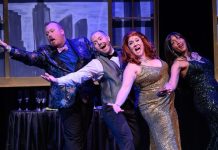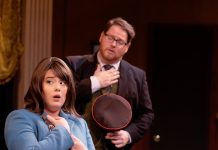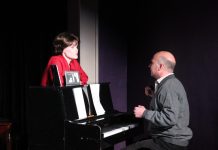Here is Part 3 of a series of interviews with the director, producer, and cast of Reston Community Players’ production of Terrence McNally’s Master Class. Meet
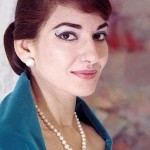
Maria Callas, one of the most famous opera divas of all time, is teaching a master class in front of a live audience at Reston Community Center’s CenterStage from January 15-30, 2016.
Glamorous, commanding, larger than life, caustic, and surprisingly drop-dead funny, Maria is alternately dismayed and impressed by the three students who bravely enter the music studio at Juilliard, hoping for a gram of inspiration from the famed soprano. Maria frequently retreats into recollections of her own life and triumphs at La Scala with searing monologues about the unforgiving press, her affair with Aristotle Onassis, and her sacrifice taken in the name of art.
https://youtu.be/Jhh9BRhcNGI
Diane Jackson Schnoor: Please introduce yourself to our readers.
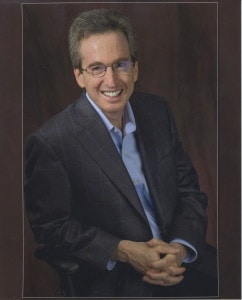
I’m David Rohde, and I’m playing Manny Weinstock, the pianist who accompanies the opera students who sing for Maria Callas in her master classes at Juilliard in the early 1970s. Audiences usually see me, or at least hear me, in the orchestra pit, or wherever the orchestra for a musical finds itself in theaters around the Washington area. I’ve previously conducted RCP’s productions of City of Angels and Legally Blonde. As a theatrical musical director, I’m always happy to accept a bit of “business” in a show involving gestures or lines if the stage director thinks it works. But this is my first actual stage role in over a decade. Or maybe two decades. People will just have to guess on that one depending on how I do.
What drew you to Master Class?
I’m a multi-genre guy who can be happy playing a Bach partita on the piano one day and the synthesizer in a rock musical the next day. But there’s nothing I love better than accompanying singers. When Rosemary (the director) and Kate (the co-producer) were casting about for someone who could take on Manny, it turned out to be a great fit. Also, Lisa Anne Bailey, who’s playing Maria Callas, is one of my closest collaborators in local theater. We’ve done several musicals together as director and musical director, she’s been an actress in shows I’ve conducted with other stage directors, and I’ve played keyboards for other conductors in yet other shows that Lisa has either performed in or directed. I know the special quality and philosophy that Lisa brings to the stage, and to be there with her and literally playing off of her character in real time is a special privilege.
Who do you play in the show and how do you relate to your character? What do you like most about your character? What do you like least about your character?
Manny is a staff pianist at Juilliard who has a job to do. I like the fact that Manny thoroughly knows the operatic literature and is ready to play whatever the students presume to sing for Maria Callas. Because Juilliard is across the street from both the Metropolitan Opera and whatever the hall where the New York Philharmonic plays was called during the 1970s, I like to think that the guy gets a bit of work around town but hasn’t landed the big, glamorous concert position and probably never will. I pick that up from the fact that Maria forgets who he is a couple of times, as well as Manny’s own slight jadedness over the whole situation. Nevertheless, by the end of the play he has insinuated himself in the environment that Maria has created and she’s shared a private observation or two with him. All of the performing arts rely on the Manny Weinstocks of the world to fill positions without which no work would ever get done.
What is your favorite line in the show (yours or somebody else’s) and why?
The students in the master class complain at certain points that Maria contradicts herself, so you have to listen closely to understand whether she means things literally or not. At one point, a student comes on stage and dares to announce that not only is he a tenor but he’s going to sing a big Puccini aria from the opera Tosca – you know, the kind of thing you hear “The Three Tenors” do. Maria is already on guard against tenors, and she warns him not to hold the high B-flat in the next-to-last bar for longer than Puccini wrote it or she’s going to chop off his head. What’s funny about that line is that Maria Callas’ 1953 recording of Tosca is considered one of the greatest opera recordings of all time, and in that recording her tenor, Giuseppe di Stefano, holds the high B-flat for practically the rest of the decade.
I think what Maria means is that you can’t sing the note like that until you’ve earned the right to do so – not so much musically but dramatically. She then demonstrates through several pointed questions that the young tenor doesn’t know the specific locale and motivation of the song until she explains it to him. It’s a terrific moment where she’s employing a musical choice to fundamentally make a point about drama, even if the way she gets there frustrates her more literal-minded students.
What advice and suggestions has the director given you that you have found most helpful as you prepare for your role?
The idea of voice students singing for an opera star in a master class has a strong analogy to musical theater actors auditioning to get into a show. In that environment where I’m one of the people who is holding the auditions, I’ve been nice to people for years no matter who they are. But that’s not really Manny’s attitude. To him this master class is more like a day at the office and if these poor conservatory students’ feelings get hurt, hey, that’s just the way it goes. Rosemary tells me in rehearsal that I smile too much at the other people on stage in a way that Manny wouldn’t. I’m working on cutting that out!
What is your favorite scene in Master Class that you are in and why?
I should probably say it’s the scene with that luscious Puccini aria or one where a student sings of her lost love in a pearly set of floating vocal passages from the bel canto or “beautiful singing” era of opera. But in fact my favorite is this absolutely demonic music from the first appearance of Lady Macbeth in Verdi’s opera Macbeth. It’s one of the great scenes in opera and really challenging for anyone to pull off. Verdi alternates some mock-martial music with heart-pounding crescendos representing Lady Macbeth’s murderous resolution vs. her husband’s hesitation and doubt. The soprano gets to be the “bad guy” and in our show Maria pressures her student to go all the way with the music lest she be unfaithful to both Shakespeare and Verdi. Talk about a guilt trip! I hope this doesn’t make me a bad person to say that’s my favorite scene, but there’s some dark and disturbed stuff in a lot of the musicals I’ve done, so why should opera be any different?
What is your favorite scene in Master Class that you are not in and why?
In one of her monologues Maria talks about her own early conservatory days in Athens. There was a rival girl who Maria thought was prettier than her and who always brought oranges to school and who got all the roles and who no one ever heard from again. Maria herself couldn’t afford to buy both an orange and a pencil so she bought a pencil to write down everything in her opera scores, and she wound up performing at La Scala and Covent Garden and the Met. Today a student might not bring a pencil to music class but it’s not because they can’t lay their hands on one. It might sound ridiculous to us that a person has to choose between fruit and a pencil, but the deprivation in Greece in World War II and, even worse, in the years right after was incredible and what she says is true to life.
Last summer I visited the Harry S. Truman presidential library in Independence, Missouri, and among the filmstrips was a very telling one about the desperate conditions in Greece in 1946 and 1947 that basically led to a civil war. I can’t help relating that to Maria Callas’ stories about the choices and trade-offs she had to make as a young woman, even on something so simple as obtaining a pencil.
What makes Master Class special or unique?
There’s a strong play-within-a-play quality to it, something that you associate more with comedies than with something like this. In the play, when the students are singing, Maria is judging and critiquing them and, especially, stopping them. When we, the actual real people, are rehearsing Master Class itself, the same thing is basically happening in its outer shell. Are we executing the things that our characters are doing “wrong” and “right” with the correct timing? When someone says “stop,” is that in real life in the rehearsal hall or part of the play? In my case, does Manny keep playing or not? Working out that timing and spontaneity is very rewarding if we do it right.
What do you admire most about your fellow castmates’ performances?
Their commitment to the art form. Some of the specific attitudes and preconceptions of the students they are portraying may be dated, but their passion for opera isn’t. The characters’ devotion and knowledge and hunger for what opera has meant to people and could mean in the future isn’t something that can be faked, it’s something that our cast has brought right to the table. I’m sure the audience will feel that right from the start.
What is the most frightening or daunting thing about presenting Master Class?
The fact that I have to sing while I play the piano! It happens quickly at a couple of points as Manny is “marking” lines of incidental characters who intrude on the big songs with bits of plot information or sarcastic side comments about what’s being expressed. And he’s doing it in Italian, of course. We’ll see whether people think I sing all right or if I “sing like a conductor” which is kind of a standard insult in the musical world.
What do you hope audiences take away from seeing Master Class?
Nowadays in opera culture it’s a cliché that “the acting is really important” as opera companies compete with musical theater and everything else out there for attention and audiences. I think that’s great, but I don’t think that all opera singers or stage directors always know what “good” acting is. You can still go to an opera and sometimes see people self-consciously depicting or “pretending to be” someone else rather than actually inhabiting another person’s body and psyche and energy. Yet here’s Maria Callas from over 40 years ago to explain exactly that distinction, even if it’s in her own unsystematic, instinctual and even maddening sort of way. There’s a reason that the playwright, Terrence McNally, got fired up about opera and I hope that audiences absorb some of the history and philosophy of this unique mode of performance, and begin their own quest to find their own Maria Callas of today who they can work into their own diversity of cultural experiences.
Master Class plays from January 15-30, 2016 at Reston Community Players performing at CenterStage at the Reston Community Center – 2310 Colts Neck Road, in Reston, VA. For tickets, call the box office at (703) 476-4500, then press 3 for the 24-hour ticket ordering system. or purchase them online.
CenterStage is handicap accessible and offers listening devices for the hearing impaired.
LINK:
Meet the Cast, Director, and Producer of Reston Community Players’ ‘Master Class’: Part 1: Director Rosemary Hartman and Producer Kate Keifer.
Meet the Cast of Reston Community Players’ ‘Master Class’: Part 2: Lisa Anne Bailey.
Meet the Cast of Reston Community Players’ Master Class’: Part 3: David Rohde.



